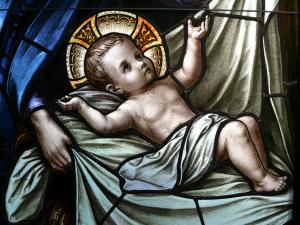I think pastor Doug Wilson and I would agree that the Christmas song wars are more obnoxious and pointless than most of the songs that inspire them. In the broader culture, the current bogey is “Baby, It’s Cold Outside.” In the theological literati subculture it’s “Mary, Did You Know?”. The complaint against the second boils down to people not understanding lyrical pedagogy. Yes, Mary knew much of what Mark Lowry asks, though she was probably fuzzy on the details. Nevertheless, as he sings, Mary’s Son had indeed “walked where angels trod,” and when she kissed her little baby, she most certainly “kissed the face of God.”
This is true in more than a merely poetic sense. It is true in the deep-down, bone-and-marrow theological sense of Christianity’s greatest creeds. In the Incarnation, God the Son, in whom dwells the fullness of Deity, took on a face, flesh, blood, and eyes which (as Wilson says) looked very much like His mother’s. He did this so He could dwell with us, which is in fact the meaning of the name Isaiah gave to the Messiah: Immanuel—“God with us.”
 Most evangelical Protestants, like pastor Wilson, take issue with very similar language that calls Mary the “mother of God,” something which I argued here is an inescapable consequence of Chalcedonian Christology, and nothing we Protestants should fear. Pastor Wilson disagrees, and in his response to me, insists it isn’t Nestorian to reject the title “mother of God” in favor of the original Greek “theotokos,” or the less wieldy “mother-of-the-One-who-is-God.” I don’t know how he feels about “Mary, Did You Know?” but I do know that rank-and-file evangelicals love the song, despite the fact that most of them would join Wilson in demurring from the “mother of God” terminology.
Most evangelical Protestants, like pastor Wilson, take issue with very similar language that calls Mary the “mother of God,” something which I argued here is an inescapable consequence of Chalcedonian Christology, and nothing we Protestants should fear. Pastor Wilson disagrees, and in his response to me, insists it isn’t Nestorian to reject the title “mother of God” in favor of the original Greek “theotokos,” or the less wieldy “mother-of-the-One-who-is-God.” I don’t know how he feels about “Mary, Did You Know?” but I do know that rank-and-file evangelicals love the song, despite the fact that most of them would join Wilson in demurring from the “mother of God” terminology.
But if evangelicals are willing to admit that God has a face, and that His mom kissed it, then there is hope that what we’re dealing with here is an inconsistency born of overreaction against Roman Catholicism, not a departure from conciliar orthodoxy.
Let me just say that I appreciate pastor Wilson’s polite engagement—especially since, considering our relative ages, credentials, levels of education, and the debt of discipleship-by-blog I owe him, this isn’t anything like a fair fight. Here’s why I’m sticking to my guns, despite all of this:
Two chapters after naming the Messiah “God with us,” Isaiah gives Him the additional titles “Wonderful Counselor,” “Mighty God,” “Everlasting Father,” and “Prince of Peace.” I got goosebumps hearing these sung by a choir and orchestra performing Handel’s “Messiah” Tuesday night. My one-year-old son was less impressed. But the fact that Isaiah ascribes deity to Jesus wasn’t lost on the authors of the gospels, nor was it lost on Paul who says in Acts 20:28 that God bought the church “with His own blood.”
The point is that Jesus is God, full stop, no “ifs,” “ands” or “buts.” When we talk of Jesus doing, being, or experiencing something, we can talk of God doing, being, or experiencing that thing without qualification or hesitation. That is the full, knock-the-wind-out-of-you impact of the Incarnation. The immutable God changes. The impassible God feels. The omnipresent God travels. The omniscient God learns. The self-sufficient God hungers. The immortal God dies. Anyone who has read the gospel accounts and does not believe the Lord Jesus was pulling the wool over our eyes with some Docetic hocus-pocus knows this is so. He was not pretending. As Aslan said, He was and is a true beast.
Pastor Wilson seems to agree with this. He writes:
“That which is predicated of one nature (Deity) may be predicated of the person (the Lord Jesus). That which is predicated of the other nature (humanity) can also be predicated of the person (the Lord Jesus). Thus we can say the Lord Jesus is Almighty God. Jesus is Jehovah. And we can also say that characteristics of finite humanity can be applied to Jesus, without qualification. He slept because He was tired. He ate because He was hungry. He walked because He needed to get there.”
Here Pastor Wilson is 100% correct. Natures do not sleep. Natures do not eat. Natures do not walk. They do not do anything, strictly speaking. They are the ontic means by which persons do these things. And to reify a nature, whether human or Divine, is to create a functional second person. It means you have two Christs in place of one—a human Christ and a Divine Christ.
Pastor Wilson continues: “But that which is predicated of one nature cannot be predicated of the other nature. That way lies madness. Infinitude is not finite.”
Again, well said. But I am afraid that we part ways, here. Because what he does next is conflate or at least confuse natures with persons. Referring to the Lutheran view of the Lord’s Supper (which as best I understand it, says that Christ’s Divine nature imparts the attribute of omnipresence to His human body) Wilson suggests that the term “mother of God” similarly blends Christ’s two natures. He writes:
“So then, do I confess that Mary is theotokos, God-bearer? I most certainly do — as regards His manhood. This is not a Nestorian reading.”
What Pastor Wilson misses is that theotokos and ‘mother of God’ both depend on a relation between *persons,* not natures. When Chalcedon called Mary ‘bearer/birth-giver of God,’ they were not affirming that Mary bore or created Divinity, but rather that she bore a Divine Person, according to His human nature. The distinction is fine but very important.
Natures do not have mothers. They do not have disciples. They do not perform miracles. They do not die on crosses or rise on the third day. Persons do these things *according to* natures. My mother is not the mother of my human nature (though she is one of the sources of it). She is the mother of me, the person. In the same way, Mary is not the mother of a human nature, but of God the Son *according to* His human nature. When Mary kissed her little baby, she indeed kissed the face of God. He was, after all, “with us,” not off somewhere else. But reverse the equation: if God was a baby, then that baby had a mother. All babies do.
Calling Mary “the mother of God” doesn’t confuse Jesus’ natures, at all, because Mary is not the mother of His human nature, but of His Person. As Chalcedon says, she bore God. And she is not a flatbed truck. She is a woman. And when women “bear” persons, we have a word to describe what they become: mothers.
No one believes (or as best I can tell, has ever believed) that Mary was the source of Jesus’ Divine nature. This has never been what the title “Mother of God” denotes. Rather, she stands in the personal relation to Him which we call “motherhood”—that relation constituted by having conceived, gestated, and given birth to a person. He is her Son.
If, as Chalcedon said, Mary bore God, how is that different (as Wilson believes) from calling her the “mother of God”? Who, exactly, did she bear, if not God incarnate? Whose face did she kiss? Who, according to Isaiah, came to dwell with us? Who shed His blood for His Church? It was not an impersonal human nature that did all this. It was the one true God, by virtue of the human nature He assumed in Mary’s womb. There is only one Logos. There is only one God the Son. He has existed from all eternity. But if He was not the son of Mary, then who on earth was in that manger?












